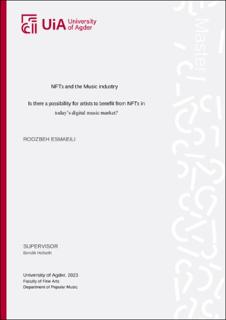| dc.description.abstract | The primary focus of this thesis is based on Web 3.0 technology, specifically Non-Fungible-Token (NFT). This phenomenon represents an innovation in blockchain technology. NFT enables purchasing and selling of digital items such as art, music, books, images, text, etc. Due to the use of blockchain technology and the unique nature of NFT tokens, they cannot be duplicated and are nearly secure (which will be explained why later in the paper). Moreover, the purpose of this paper is to determine what this innovation is and how music artists and fans can use it to create a unique engagement with one another, how fans can support their favorite artist, and explore new opportunities presented by the NFTs, which provide artists with a unique payment system that enables them to earn more income than ever before. The paper begins with the definition and delimitation of the relevant music industry and a brief history of what has been accomplished so far in the music industry, copyright law, how NFTs have progressed, and how digitalization has impacted the music industry.
In addition, the Internet and Web 1.0, Web 2.0, and Web 3.0 are explained. Lastly, I’ll discuss the advantages the Web 3.0 application has over previous innovations.
A qualitative research method has been selected because the topic is uncharted, and the relationship between this specific technology and the music industry is not well-researched, so I conducted my own investigation through semi-structured interviews with experts from both industries. The most critical issues and opportunities discussed in this paper are usability and technical challenges, environmental challenges, legal frameworks, business models, the market, and political issues.
The paper concludes that the primary problems within the music industry are not inherently rooted in digitalization, even though digitalization is the foundation of these problems. The problems are essentially political, with the decision-making within the music industry determining how the economy should function. Different parties remain an adversary to each other, resulting in the dysfunction of the music industry. This is why NFTs cannot resolve all systemic issues. However, if those in charge of the music industry allow it to operate properly, they have the potential to assist the industry. | |
